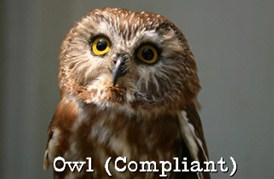ARTICLES
- Main Principles of Humanistic Psychology : Understanding Humans as Complete Individuals
- Your Complete Roadmap To Recovering From Ghosting
- 10 Telltale Signs You are in a Cookie Jarring Relationship
- How to Shape a Positive and Confident Personality in Your Pet Bird
- How to Choose a Pet Bird That Complements Your Lifestyle and Personality
Bird Personality : Owl

If you are an owl type person, your common characteristics are :
- Work/task oriented.
- Discipline, thorough, meticulous, tend to be perfectionist
- Conscientious in talking and tend to criticize.
- Prioritize system and qualities
- They use methodological approach, use strategies that are proven for their success.
- Always complete the tasks they execute
- Need rules and quality
- Analyze and thereafter make a decision after performing an evaluation.
- They choose to finish harder tasks than the easier ones.
- They will not answer directly when asked, they will wait, analyze, and then answer
- They will always consider the pros and contras over each situation
- Able to implement their own skill
- They will answer a question based on the person asking the question because they want their answers to be perfect
- They will make a lot of consideration in decision making and that usually result in more time consuming for decision making
- They will not escape from problem
- Have extensive patience
- They tend not to change their opinion once they made a decision on something, even if they experience conflict of conscious
- Have multitasking ability
- They want to accomplish more than two goals at one time
- Can be motivated under good guidance
- They can easily adapt
Owl is Motivated By
- Sufficient time availability to complete tasks
- Privacy, peaceful and tranquillity with minimum disturbance
- Chance to plan the future in details
- Surrounded by people with positive characteristics
- People who need and appreciate them
- Help others
- Seek for conflict solution
Owl Dislikes
- Criticism towards themselves
- Everything that is below standard, untidiness, disregard of quality
- Hastiness, change, obscurity, reckless behaviour
- Inaccurate, untrustworthy information, disregard of facts
- Incompetence, shortcuts utilization
- Immoderate mattes, inaccurate records, out of focus
- Talking about personal matters
How to Communicate With an Owl Type Person?
- When having discussion, prepare logic reasons, facts, and accurate data that can be acceptable for “owl” type people. “Owl” type people need “why” and “how” answers.
- Provide them with profit-loss, good-bad, pro-contra regarding the discussed topic.
- Avoid aggressive approach
- Avoid arguments
- Avoid incomprehensive reply
- Give credit for their work quality, accuracy and precision.
The Strengths of Owl Personality
- Detail-oriented
- Mindful
- Curious
- Meticulous
- Calm
- Introverted
- Determined
- Careful
- Conservative
The Weaknesses of Owl Personality
- Distrusting
- Self-centered
- Indecisive
- Vindictive
- Short-sighted
Owl Career Match
- Accountant
- Architect
- Airplane Pilot
- Job Analyst
- Physical Assistant
- Medical Record Technician
- Nurse, General Duty
- Nurse, Licensed Practical
- Secretary
- Environmental Analyst
- Mail Clerk
- Painter
- Caseworker
- Biochemist
- District Ext. Service Agent
- Geologist
- Historian
You May Also Like :
- Exploring Real-world Applications of Kinesthetic Intelligence
- Bird Personality : Dove
- Difference Between Stress and Depression
- Setting Specific and Achievable Goals
- The Benefits of Spending Time in Silence for Your Happiness and Well-being
- Tips for Achieving a Good Work-Life Balance
- The Negative Impact of Blaming and Strategies for Change
DOVE
EAGLE
OWL
PEACOCK
